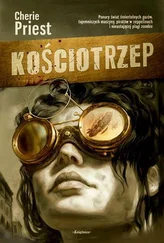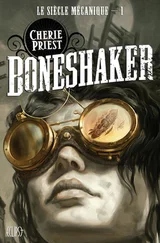Cherie Priest - Dreadnought
Здесь есть возможность читать онлайн «Cherie Priest - Dreadnought» весь текст электронной книги совершенно бесплатно (целиком полную версию без сокращений). В некоторых случаях можно слушать аудио, скачать через торрент в формате fb2 и присутствует краткое содержание. Год выпуска: 2010, ISBN: 2010, Жанр: Фантастика и фэнтези, на английском языке. Описание произведения, (предисловие) а так же отзывы посетителей доступны на портале библиотеки ЛибКат.
- Название:Dreadnought
- Автор:
- Жанр:
- Год:2010
- ISBN:978-0-7653-2578-5
- Рейтинг книги:3 / 5. Голосов: 1
-
Избранное:Добавить в избранное
- Отзывы:
-
Ваша оценка:
- 60
- 1
- 2
- 3
- 4
- 5
Dreadnought: краткое содержание, описание и аннотация
Предлагаем к чтению аннотацию, описание, краткое содержание или предисловие (зависит от того, что написал сам автор книги «Dreadnought»). Если вы не нашли необходимую информацию о книге — напишите в комментариях, мы постараемся отыскать её.
Dreadnought — читать онлайн бесплатно полную книгу (весь текст) целиком
Ниже представлен текст книги, разбитый по страницам. Система сохранения места последней прочитанной страницы, позволяет с удобством читать онлайн бесплатно книгу «Dreadnought», без необходимости каждый раз заново искать на чём Вы остановились. Поставьте закладку, и сможете в любой момент перейти на страницу, на которой закончили чтение.
Интервал:
Закладка:
It had been so long since she’d seen Phillip, and now she wouldn’t see him again. That ought to make his face, or the sound of his voice, more precious to her mind, but strangely, this wasn’t so. What was left in his absence was an empty, sorrowful discomfort. She wondered if it wouldn’t eventually grow dull or dim if she worried at it enough, or softened and more palatable. Easier to overlook. Forgotten, or at least smoothed into some pearl-like blandness, if not a thing of beauty.
She looked around her car, which was laden with comfortably middle-class women of many shapes and ages, plus a few surly children who’d had the seriousness of the occasion impressed upon them until they grudgingly held their tongues.
The first two hours on the track between Fort Chattanooga and Memphis passed dully, with all the passengers acting docile and blank, waiting for their destination, and counting on precious little entertainment in the interim. But in the third hour, Mercy was startled by a tap on her shoulder. When she turned around, she gazed up into the face of a mulatto woman, perhaps forty years old or a little more.
She was dressed in clothing nicer than anything Mercy had ever personally owned, and she smelled faintly of gardenias, or some perfume derived therefrom. Her hair had been braided up and back, and a hat was perched on it with such firmness that the nurse doubted she could’ve knocked it loose with a stick.
“Pardon me,” said the woman. “I don’t mean to bother you, but I was wondering if you were a nurse. I saw the cloak, and your bag, there.”
“Yes, I’m a nurse.”
“From the fields?”
“Not on purpose,” Mercy said. “But I been in the fields, just the other night.”
The train gave a shrug as it changed its velocity to climb a low grade. The woman shrugged with it and asked, “Could I sit here, just a moment?”
Mercy said, “I don’t see why not,” even though she was pretty sure that plenty of other people in the car could think of a few good reasons. Most of the other women in the car shifted or adjusted their luggage, and either pretended not to look, or made a point of looking. Still, Mercy gestured to the empty seat on the aisle.
But the woman kept standing, and said, “My name’s Agatha Hyde, and I’m on my way to Memphis to meet my brother. My son-he’s in the next car back-he was tomfooling around this morning as we were getting ready to leave, and I’m afraid he might have broken his foot falling down the stairs. We wrapped him up and headed out because we had a train to catch, same as everyone on board here; but he won’t stop crying about it, and it seems like it’s swelling up something awful. I was hoping, maybe, that I could ask you if you’d take a look at it.”
“Mrs. . . . Mrs. Hyde,” Mercy said, “I’m not a doctor or anything, and-”
“I can pay you,” she said quickly. “I can appreciate the position I’m putting you in, here like this, but my boy’s only a little thing, and I’d hate for him to grow up lame because I didn’t know how to fix his bones and we couldn’t find a colored doctor till Memphis.”
Mercy opened her mouth to say something about how it wasn’t about the money, but the money did in fact make it easier for her to say, “I suppose I could take a look. I can’t make you any promises, though.”
Someone to the rear of the car said, “Honestly,” under her breath, but no one else said a word as Mercy collected her bag and followed the older woman back into the next car.
The next car back was emptier than Mercy’s. Most of the people in it had skin in shades varying from toffee to ink, and there was a greater spread of passengers represented, from working class to leisure class. Again, she mostly saw women and children; but a few old men gathered at the back, playing chess on a board they balanced on the seat between them. Everyone gazed at her curiously. Mercy stiffened, but said, “Hello.”
Some of them said hello back, and some of them didn’t.
Mrs. Hyde led Mercy over to a corner row, where two brown children were wearing crisp Sunday clothes. One of them had his arms crossed over his chest, and dried tear-trails marking his cheeks. His foot was wrapped up to such a size that he could’ve hidden a hatbox under the bandages.
Mercy took the bench across from him and said, “Hi, there, um . . .”
“His name’s Charles.”
“Charles, all right. Hi, there, Charles. I’m Nurse Mercy,” she told him, and gestured at his foot. “Your momma’s asked me to take a peek at your foot. Would that be fine with you?”
He ran his forearm under his nose to wipe it, and squinted at her. Charles was seven or eight, and he looked precisely as disgruntled as one might expect from a boy with his foot wrapped so extensively. But he nodded, and Mercy told him, “Good. That’s good.”
Children had never been her favorite patients, though, as the doctors at Robertson had pointed out more than once, grown men often behaved far worse than little boys. Mercy couldn’t argue, but she hadn’t had little boys in her care too much, except for a few of the other nurses’ children, or the children of the widows or wives of the maimed who came to the hospital to visit. Small colored children were even farther out of her realm of expertise, and small colored children with monied parents went right past her threshold of experience.
But all things being equal, she figured a busted-up leg was a busted-up leg, and there was no sense in letting the little fellow suffer from it if there was anything she could do about it.
So she did her best to ignore the inquisitive eyes that followed her every move. Before long, she came to the conclusion that she was not much more out of place in the colored car than in the rich car, where her fellow passengers were high-class ladies who’d never worked a day in their lives, with their trussed-up offspring and upturned noses.
She turned back to Charles, saying, “Here, I’m just gonna pick up your leg and set it on my knees, you see?” as she took the tiny leg and began the process of unwinding the swaths of cloth that bound it.
Mrs. Hyde said, “I do appreciate you taking the time like this. I know you’re only traveling, and not working, and as I told you, I don’t mind paying for the service. There’s not a doctor on this train, and even if there was one, I don’t know that he’d bother with us. But I thought maybe another woman . . .”
Mercy said, “I understand,” because she did, and because she wasn’t sure what else she should say to follow that.
“Do you have any children of your own?”
“No,” she said. “My husband died not long after we married. We never had no children.”
“I’m sorry,” said Mrs. Hyde. “He died in the war?”
Mercy nodded. And suddenly, because she’d wanted to say it for so long, but had no one to say it to, she blurted out in a hard whisper, “He was from Kentucky. He died at Andersonville.”
Taken aback, Mrs. Hyde said, “But you . . . you’re-”
“I been working at the Rebel hospital up in Richmond. Patching up the grays.”
“Oh my,” said the other woman. “It’s . . .” She hesitated. “These are complicated times. And I’m sorry about your Yank,” she said the word softly. “But I’m glad you’re here on board, and I mean every word when I say I thank you.”
Mercy reached the end of the winding bandages. The limb she unwrapped had met some terrible event; that much was plain. The top of the foot was swollen far beyond its regular size, and Charles’s tears flowed afresh when the nurse prodded it.
Mercy asked, “What’d he do, exactly?”
Mrs. Hyde frowned at the child, who grimaced back with his lower lip puckering. “He fell down the stairs, running after his sister. If he’d had his shoes on like I told him, he might not’ve slipped.”
Читать дальшеИнтервал:
Закладка:
Похожие книги на «Dreadnought»
Представляем Вашему вниманию похожие книги на «Dreadnought» списком для выбора. Мы отобрали схожую по названию и смыслу литературу в надежде предоставить читателям больше вариантов отыскать новые, интересные, ещё непрочитанные произведения.
Обсуждение, отзывы о книге «Dreadnought» и просто собственные мнения читателей. Оставьте ваши комментарии, напишите, что Вы думаете о произведении, его смысле или главных героях. Укажите что конкретно понравилось, а что нет, и почему Вы так считаете.










